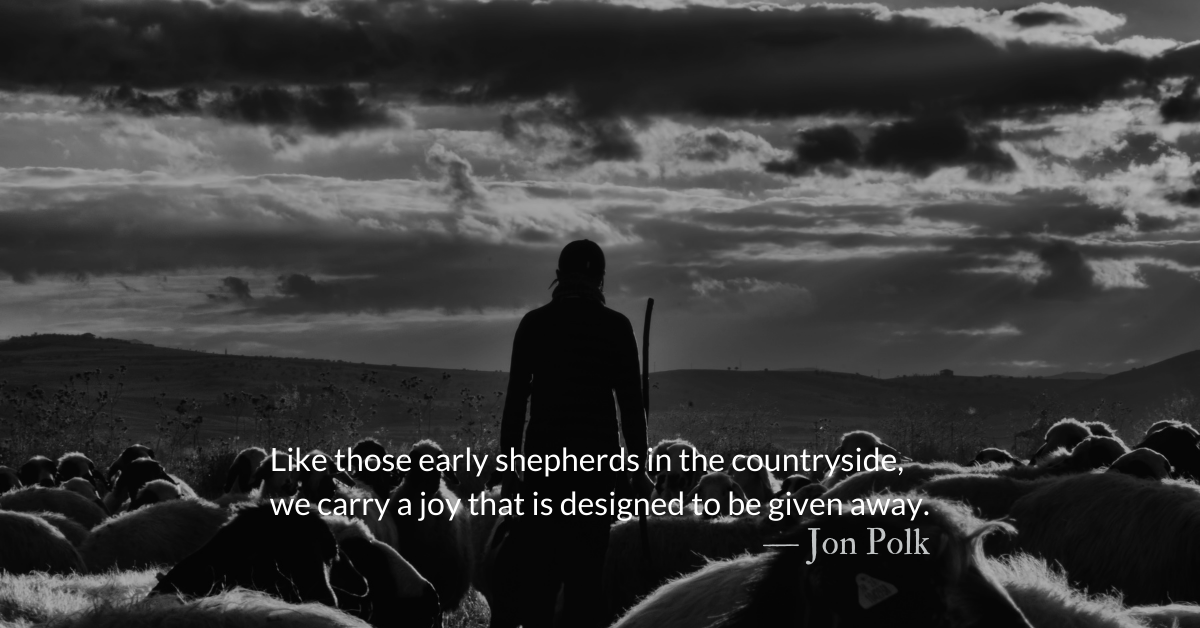Scripture Focus: John 5.24-26
24 “Very truly I tell you, whoever hears my word and believes him who sent me has eternal life and will not be judged but has crossed over from death to life. 25 Very truly I tell you, a time is coming and has now come when the dead will hear the voice of the Son of God and those who hear will live. 26 For as the Father has life in himself, so he has granted the Son also to have life in himself.
Luke 1.31-33
31 You will conceive and give birth to a son, and you are to call him Jesus. 32 He will be great and will be called the Son of the Most High. The Lord God will give him the throne of his father David, 33 and he will reign over Jacob’s descendants forever; his kingdom will never end.
Reflection: Good Christian Men, Rejoice — Carols of Advent Joy
By Jon Polk
There is a fascinating story behind the origins of the nearly seven-hundred year-old Christmas carol, “Good Christian Men, Rejoice.”
The original text of this hymn, “In Dulci Jubilo,” was written by German mystic and Dominican monk, Heinrich Seuse, sometime in the early 1300s. Folklore relates that Seuse had a vision in which he heard angels singing the words of the hymn and upon hearing them, he joined with the angels in a dance of joy.
Good Christian men rejoice
With heart and soul and voice!
Give ye heed to what we say
Jesus Christ is born today!
Ox and ass before Him bow
And He is in the manger now
Christ is born today!
Christ is born today!
Seuse’s biography states:
Now this same angel came up to [Seuse] brightly, and said that God had sent him down to him, to bring him heavenly joys amid his sufferings; adding that he must cast off all his sorrows from his mind and bear them company, and that he must also dance with them in heavenly fashion. Then they drew [Seuse] by the hand into the dance, and the youth began a joyous song about the infant Jesus.
Who wouldn’t want to sluff off their sufferings and sorrows and dance with an angel choir in reckless abandonment and joy?
While Advent marks the beginning of the church’s liturgical year, it is also providential that this season falls at the end of the calendar year. For it is this period in which we are often most reflective and contemplative about life and the experiences of the previous twelve months. In some years, such as this one, the exercise of remembering can be disheartening.
Therefore, we need joy.
We need to dance.
We need to be reminded of the one who has borne our suffering and sorrow.
We need to choose to embrace true joy, even in the midst of difficulty.
The original version of “Good Christian Men, Rejoice” is one of the oldest examples of a macaronic hymn, a song text in multiple languages, in this case both Latin and German. Because of this, later Reformers would use this hymn and others in congregational singing. Since worship services of the day were conducted in Latin, the German vernacular in hymn texts served to proclaim truth to the largely uneducated common folk.
What truths does this carol proclaim? Wherein is found our joy?
Jesus Christ was born today!
Jesus Christ was born for this!
Jesus Christ was born to save!
In light of this good news, let us all rejoice with heart and soul and voice!
Listen: Good Christian Men, Rejoice by Smalltown Poets
Read: Lyrics from Hymnary.org
Divine Hours Prayer: The Greeting
My lips will sing with joy when I play to you, and so will my soul, which you have redeemed. — Psalm 71.23
– Divine Hours prayers from The Divine Hours: Prayers for Autumn and Wintertime by Phyllis Tickle
Today’s Readings
Zechariah 2 (Listen – 1:41)
John 5 (Listen – 5:42)
Read more about End of Year Giving and Supporting our work
Why should you give?
Support biblical literacy
Support rhythmic engagement in Scripture and prayer
Read more about He Rejoices Over Us — Love of Advent
Zephaniah looks forward with joy to when Israel’s purpose would be fulfilled in God.












